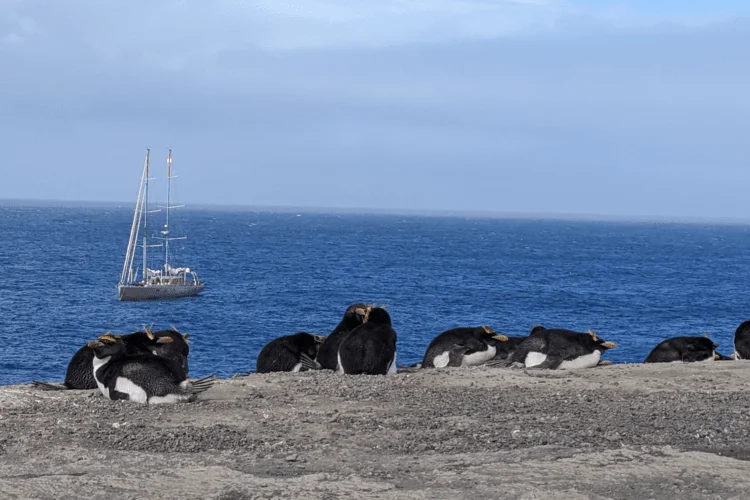
Environmentalist Claudia Colesie talks to Bryony Cottam about her top tips for dealing with difficult situations on an expedition.

PASSPORT
When Claudia Colesie embarked on an expedition to Antarctica's remote Zavodovski Island, known as one of the stormiest places on Earth, she knew the journey would not go smoothly. Still, the challenges she and a team of fellow scientists faced during this long journey would test the most experienced explorer.
Strong winds forced their sailboat to take shelter in several places in the South Sandwich Archipelago en route to Zavodovski, delaying their arrival for several days. A medical emergency also meant an extended stay on South Georgia Island. In total, the team spent seven weeks at sea. “It was my first time on a sailboat,” says Colesie. “It was a pretty extreme baptism of fire.”
CLAUDIA’S TRAVEL TIPS
• Travel with people you trust and are experts in their profession
• Teamwork is essential and must be forged quickly, sometimes in difficult circumstances with people you don't know.
All this time, scientists weren't sure what they would find on the island. Bird flu had spread to Antarctica and the accompanying film crew – who had planned a documentary on the island's wildlife – withdrew before departure, certain that devastation awaited them . “Everything had to be disinfected in several stages, from
when we boarded the boat, when we arrived on the island and again when we left, to prevent its spread,” says Colesie. “Keeping our distance from the birds was obligatory throughout.”
They were very lucky, she said, to see no signs of bird flu when they arrived. This luck, however, was short-lived. The first night, a storm ravaged their camp, destroying their tents. As winds battered the island, Colesie and his colleagues rushed to save their equipment and set up a new camp in a safe site. “It was a completely wasted two days for science, as we had to ensure our survival.” A few days later, with no emergency tents and another severe storm on the horizon, the team had no choice but to evacuate.

What should have been a three-week field campaign on Zavodovski turned into six days – only four of which could be devoted to science. “It was very frustrating, but of course it was the right choice not to take a risk.”
Despite the many setbacks, the team accomplished a lot in a short time. Colesie, a terrestrial ecologist, says she spent 20 hours a day studying as much of the small island as possible, collecting samples of the plant life that has adapted to the extreme weather conditions.
Another researcher surveyed the island by drone, counting the number of chinstrap penguins – more than a million, making it the largest penguin colony in the world. As tourism increases in Antarctica, this research will help conservationists protect local wildlife. “It’s difficult to develop a management plan if you don’t know what’s in it,” says Colesie.
Throughout the storms, and despite being seasick, Colesie even managed to film the expedition with her phone. “The marketing team made a wonderful video out of it,” she adds.
There are a few things that will help any traveler facing adversity, especially in a place as remote as Antarctica. The first is to travel with people you trust and can trust to do their job well. “We were incredibly well supported by the sailboat crew on the boat and I felt very safe in their hands,” says Colesie. “They were absolute experts in their field and if we ever started to get stressed about things, they were always able to keep us calm.”
The second is teamwork. “You have to respect each other and work well together. That's what gives you the strength to get through when things get tough.” Colesie says on a school trip it's not as easy as it seems. Often you travel with people you've never met before. “It can add an extra element of challenge, but you have to remember that everyone is in the same boat. I think that's what got us through all these difficult situations.


